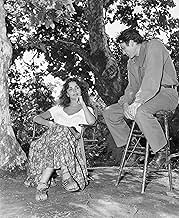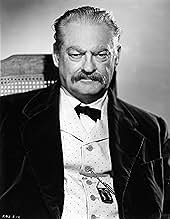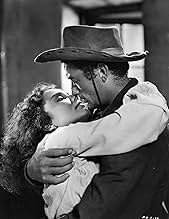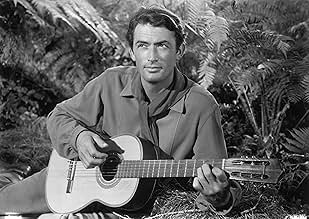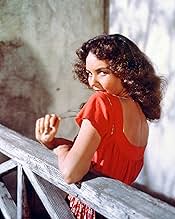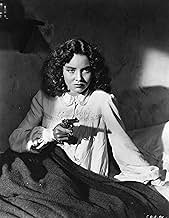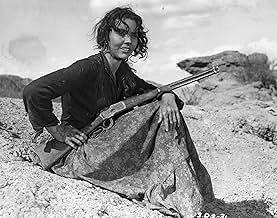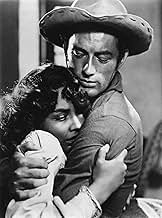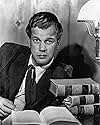AVALIAÇÃO DA IMDb
6,7/10
10 mil
SUA AVALIAÇÃO
Adicionar um enredo no seu idiomaBeautiful, biracial Pearl Chavez becomes the ward of her dead father's first love and finds herself torn between two brothers, one good and the other bad.Beautiful, biracial Pearl Chavez becomes the ward of her dead father's first love and finds herself torn between two brothers, one good and the other bad.Beautiful, biracial Pearl Chavez becomes the ward of her dead father's first love and finds herself torn between two brothers, one good and the other bad.
- Indicado a 2 Oscars
- 3 vitórias e 4 indicações no total
Griff Barnett
- The Bordertown Jailer
- (não creditado)
John Barton
- Party Guest
- (não creditado)
Avaliações em destaque
Well, it's obvious that Selznick was trying his best to recapture that GWTW magic...but this is an unbelievably inept failure. Here's what you can expect from this overblown sex-western:
--Jennifer Jones (in pancake make-up so orange that she put me more in mind of an Oompa-Loompa than the half-breed we're supposed to see) apparently directed to act as though she's Scarlett O'Hara with a lobotomy and bad grammar.
--Gregory Peck as rogue murdering rapist and the apple of his daddy's eye. At one point even doing a pretty decent vocal imitation of Clark Gable -- too bad it's just the voice.
--Lionel Barrymore lazily repeating his "It's a Wonderful Life" role from the same year -- wheelchair & grumpiness standing in for effort.
--Butterfly McQueen as kerchiefed ditzy maid. Hmmm, wonder where they got that idea?
All in all, a miserable movie experience. You'd think that since they cribbed from the best it'd have turned out better! Go figure.
--Jennifer Jones (in pancake make-up so orange that she put me more in mind of an Oompa-Loompa than the half-breed we're supposed to see) apparently directed to act as though she's Scarlett O'Hara with a lobotomy and bad grammar.
--Gregory Peck as rogue murdering rapist and the apple of his daddy's eye. At one point even doing a pretty decent vocal imitation of Clark Gable -- too bad it's just the voice.
--Lionel Barrymore lazily repeating his "It's a Wonderful Life" role from the same year -- wheelchair & grumpiness standing in for effort.
--Butterfly McQueen as kerchiefed ditzy maid. Hmmm, wonder where they got that idea?
All in all, a miserable movie experience. You'd think that since they cribbed from the best it'd have turned out better! Go figure.
King Vidor was a long-serving and much-respected Hollywood grandmaster who took a serious interest in movie-making
"Billy the Kid" and "Duel in the Sun" hold an important place in the history of the genre
These two films in particular, along with "Northwest Passage," show Vidor's romantic vision of backwoods America and his love of natural landscape; they share, too, an earthy quality which is missing from his more routine action Westerns, "The Texas Rangers" and "Man Without a Star."
Photographed in rich color, the visual magnificence of the film was manifested in the shots of the cowboys galloping across the rolling hills; in the spectacular confrontation between the McCanles forces who aimed to defend Spanish Bit with lead and the U.S. Cavalry; in the deep red sunset sequence with Lionel Barymore as "the lonely Senator"; and in that long shot of the surreptitious meeting between Lewt and his father on the hilltop at sunset
"Duel in the Sun" is extravagantly and grandiosely passionate and romantic and its characters are much larger than life A poignant scene was the tremendous moment between two legendary actors (Lionel Barrymore & Lillian Gish) when Laura Belle said to her husband "I'm a nuisance to you even to the end. It's the first time you've been in this room since that night./I loved you, Laura Belle. Yes, sir, I loved you."
Now, when a single movie offers murder, rape, attempted fratricide, train wreck, fiery sensual dance, drunkenness, religion, range wars, prostitution, sacred and profane love and sex as the principal motivation and not as an incidental subplot, and all that against an epic background of empire-building, well, it is for the first time in a Western in such a big scale
The film featured the story of Pearl Chavez whose past is dark as her coca-stained skin and who loves everybody but loves bad Lewt most often
Gregory Peck character as Lewt is barbaric, undisciplined, untamed, overwhelming He is a bad man, all bad, but he is also the lowest, dirtiest, meanest and cool, and he knows how to laugh and have a good time
Jennifer Jones as Pearl, is the 'prettiest girl ever to set foot on Spanish Bit.' She is a marvelous overwrought minx, wild and sexy
Joseph Cotton is the calm, educated, refined, pleasant son Jesse who ultimately sides with the railroad against his father He even threatens to cut the fence wire promising: "I'd rather be on the side of the victims than of the murderers."
Lionel Barrymore is the invalid Senator Jackson McCanles who orders his son, calling him a "Judas," to leave his ranch for as long as he lives
Lillian Gish is the delicate Laura Belle who blames her husband of spoiling Lewt and she let him do so ever since he was a child making him think that rules weren't made for him
Herbert Marshall plays Scott Chavez the condemned Southern aristocrat gentleman who sends his daughter to Laura Belle, his second cousin
Charles Bickford plays Sam Pierce, the boss who gets a little ranch of his own but never run across anybody he wanted to marry Besides, he never got up nerve enough to ask anybody
Impassions, pulsating, barbaric, and thunderous, the music matches perfectly the fervid emotionalism of the story
The film received only two Academy Awards nominations
Photographed in rich color, the visual magnificence of the film was manifested in the shots of the cowboys galloping across the rolling hills; in the spectacular confrontation between the McCanles forces who aimed to defend Spanish Bit with lead and the U.S. Cavalry; in the deep red sunset sequence with Lionel Barymore as "the lonely Senator"; and in that long shot of the surreptitious meeting between Lewt and his father on the hilltop at sunset
"Duel in the Sun" is extravagantly and grandiosely passionate and romantic and its characters are much larger than life A poignant scene was the tremendous moment between two legendary actors (Lionel Barrymore & Lillian Gish) when Laura Belle said to her husband "I'm a nuisance to you even to the end. It's the first time you've been in this room since that night./I loved you, Laura Belle. Yes, sir, I loved you."
Now, when a single movie offers murder, rape, attempted fratricide, train wreck, fiery sensual dance, drunkenness, religion, range wars, prostitution, sacred and profane love and sex as the principal motivation and not as an incidental subplot, and all that against an epic background of empire-building, well, it is for the first time in a Western in such a big scale
The film featured the story of Pearl Chavez whose past is dark as her coca-stained skin and who loves everybody but loves bad Lewt most often
Gregory Peck character as Lewt is barbaric, undisciplined, untamed, overwhelming He is a bad man, all bad, but he is also the lowest, dirtiest, meanest and cool, and he knows how to laugh and have a good time
Jennifer Jones as Pearl, is the 'prettiest girl ever to set foot on Spanish Bit.' She is a marvelous overwrought minx, wild and sexy
Joseph Cotton is the calm, educated, refined, pleasant son Jesse who ultimately sides with the railroad against his father He even threatens to cut the fence wire promising: "I'd rather be on the side of the victims than of the murderers."
Lionel Barrymore is the invalid Senator Jackson McCanles who orders his son, calling him a "Judas," to leave his ranch for as long as he lives
Lillian Gish is the delicate Laura Belle who blames her husband of spoiling Lewt and she let him do so ever since he was a child making him think that rules weren't made for him
Herbert Marshall plays Scott Chavez the condemned Southern aristocrat gentleman who sends his daughter to Laura Belle, his second cousin
Charles Bickford plays Sam Pierce, the boss who gets a little ranch of his own but never run across anybody he wanted to marry Besides, he never got up nerve enough to ask anybody
Impassions, pulsating, barbaric, and thunderous, the music matches perfectly the fervid emotionalism of the story
The film received only two Academy Awards nominations
Released in 1946 and directed by King Vidor, "Duel in the Sun" stars Gregory Peck and Joseph Cotton as two rival sons of a ranch baron (Lionel Barrymore) in West Texas in the 1880s. When a striking half-breed (Jennifer Jones) comes to live on the ranch, she inspires love in the mild-mannered, educated son (Cotton) and unpredictable lust in the mocking, wild one (Peck). Lillian Gish plays the mother stuck in the middle while Walter Huston appears as a semi-questionable minister known as The Sinkiller. Charles Bickford is on hand as an older man also interested in the drama mama.
While the movie runs 2 hours and 24 minutes, a full 16 minutes is opening and ending music, which makes the runtime of the story itself just over 2 hours. Speaking of the opening "Prelude" and "Overture," the music (by Dimitri Tiomkin) is thoroughly passé and goes on way too long at 12 minutes before the credits, which last another 1:35. If you can get past that, though, this is a great old Western where the producers pulled out all the stops to entertain. Producer, writer and (uncredited) director David O. Selznick's ambition was to top "King Kong" (1933) and, particularly, "Gone with the Wind" (1939), two other pictures he produced.
Although critics fittingly dubbed it "Lust in the Dust," the movie WAS popular with the masses, no doubt helped by its controversial sexual content (which is tame today) and Selznick's affair with Jones, which broke up both of their marriages. They got married a few years later and it lasted till his death in 1965. Despite its box office success, "Duel" couldn't top "Gone with the Wind" and, being the most expensive film ever made at that point, it only broke even, although it eventually went on to make a profit with a re-release in 1954, etc.
Jones is notable as the heavy-breathing babe, but I personally prefer Joan Tetzel as the fiancé of the older son (Cotton). Also, Peck plays the bad son surprisingly well, considering how he's known for playing more noble protagonists, e.g. "The Big Country" (1958) and "Mackenna's Gold" (1969).
Bottom line: "Duel in the Sun" was just too big of a production to lose. Its story, while decidedly melodramatic, is compelling from beginning to end and there are highlights spiced throughout, including some stunning cinematography, amusing moments with horses and a couple of almost shocking sequences and story turns (e.g. the shootout in the saloon and, later, on the town street). To be expected, there are also some lowlights, but the movie always quickly recovers and maintains its footing. Lastly, there's a valuable moral hidden within the Western soap operatic shenanigans.
The film was shot in Arizona & California (too many places to list). The script was written by David O. Selznick & Oliver H.P. Garrett (and, uncredited, Ben Hecht) suggested by a novel by Niven Busch. ADDITIONAL CAST: Herbert Marshall, Harry Carey, Scott McKay & Butterfly McQueen.
GRADE: A
While the movie runs 2 hours and 24 minutes, a full 16 minutes is opening and ending music, which makes the runtime of the story itself just over 2 hours. Speaking of the opening "Prelude" and "Overture," the music (by Dimitri Tiomkin) is thoroughly passé and goes on way too long at 12 minutes before the credits, which last another 1:35. If you can get past that, though, this is a great old Western where the producers pulled out all the stops to entertain. Producer, writer and (uncredited) director David O. Selznick's ambition was to top "King Kong" (1933) and, particularly, "Gone with the Wind" (1939), two other pictures he produced.
Although critics fittingly dubbed it "Lust in the Dust," the movie WAS popular with the masses, no doubt helped by its controversial sexual content (which is tame today) and Selznick's affair with Jones, which broke up both of their marriages. They got married a few years later and it lasted till his death in 1965. Despite its box office success, "Duel" couldn't top "Gone with the Wind" and, being the most expensive film ever made at that point, it only broke even, although it eventually went on to make a profit with a re-release in 1954, etc.
Jones is notable as the heavy-breathing babe, but I personally prefer Joan Tetzel as the fiancé of the older son (Cotton). Also, Peck plays the bad son surprisingly well, considering how he's known for playing more noble protagonists, e.g. "The Big Country" (1958) and "Mackenna's Gold" (1969).
Bottom line: "Duel in the Sun" was just too big of a production to lose. Its story, while decidedly melodramatic, is compelling from beginning to end and there are highlights spiced throughout, including some stunning cinematography, amusing moments with horses and a couple of almost shocking sequences and story turns (e.g. the shootout in the saloon and, later, on the town street). To be expected, there are also some lowlights, but the movie always quickly recovers and maintains its footing. Lastly, there's a valuable moral hidden within the Western soap operatic shenanigans.
The film was shot in Arizona & California (too many places to list). The script was written by David O. Selznick & Oliver H.P. Garrett (and, uncredited, Ben Hecht) suggested by a novel by Niven Busch. ADDITIONAL CAST: Herbert Marshall, Harry Carey, Scott McKay & Butterfly McQueen.
GRADE: A
This movie is like a painting by an old master that hangs in a museum--we may not be moved by it, but we can still appreciate the artistry. Its most notable feature is the director, King Vidor, master of silent film making. As you might expect, many of the important scenes have little or no dialog. In one scene between Lionel Barrymore and Lillian Gish, he rambles on about their life together, while she strains to get out of her sickbed and crosses slowly to him, the entire distance transfigured by the depth of her love for him. Gish was a great star of silent film, with a wonderful, expressive face, full of compassion and grace. In another scene that happens under quite different circumstances, Jennifer Jones crawls to Gregory Peck, the man she loves, also without words, evincing great sorrow and quiet dignity. In both cases, the women prove they are far more noble than the men who love them so badly. Jones also has a mobile face, together with a beautiful, resonant voice. No film that has these two ladies at its center should be missed. In addition, the film has two marvelous scenes that, at the time of its making, would have been just as impressive as some of today's special effects wonders: In the first, about 20 armed horsemen face a crowd of railway workers, including some chinese, clothed in authentic period dress, with a steam engine in the background. As the tensions mount, a troop of mounted cavalry, about 100 strong, ride onto the set, filmed on location (judging by the saguarros and ocatillos) in Arizona. This was a tour de force of filmmaking at a time when shooting on location was rare. In the second scene, a train under a full head of steam jumps the tracks and plows down an embankment. Filmed in early technicolor, this movie has lush exteriors and panoramas of rich desert color. Two more character actors should be mentioned, both of whom steal every scene they enter: Butterfly McQueen, the maid whose comments are both simple and profound, and Walter Huston, as the crusty sheriff who doubles as a preacher during a funeral.
Everything about 'Duel in the Sun' is overripe: the music, the photography (those red sunsets a la GWTW), the strong emotions and the climactic duel on a blazing desert sun by the two mismatched lovers. Indeed, the excesses are almost operatic in proportion--and yet, a viewer can get caught up in this sprawling western rightly termed "Lust in the Dust" by some reviewers. The rampant sensuality of the steamy scenes between Peck and Jones are emphasized by Dimitri Tiomkin's luscious background score which becomes blistering and intense for the climactic shootout. Overproduced, overacted, overwritten--it still entertains and makes us appreciate the genius of David O. Selznick whose hand on all of the material is quite evident. Jennifer Jones was nominated for her tempestuous Pearl Chavez (but lost to Olivia de Havilland for 'To Each His Own'). Lillian Gish deserved her Oscar nomination. And last but not least, let's not forget Walter Huston, who gives the most realistic and enjoyable performance in the entire film as The Sin Killer--a wickedly funny portrayal. Weakest aspect of the film is Gregory Peck's easygoing villain--his whole performance strikes a false note and is not the least bit convincing. He and Joseph Cotten should have switched their roles--Cotten always made a more believable villain than Peck. Selznick obviously was striving to make a western on the level of GWTW--even including Butterfly McQueen for comic relief. All in all, fun to watch if you don't take any of it seriously. Not exactly a work of art--but definitely worth watching. And, oh, that ripe technicolor!
Você sabia?
- CuriosidadesAccording to King Vidor, director Josef von Sternberg was hired only as a lighting expert by David O. Selznick in order to give his wife--and the film's star--Jennifer Jones a more glamorous look.
- Erros de gravaçãoThe opening shows saguaro cacti in the valley. The film is supposed to take place in Texas, but southern Arizona is the only place in the US with saguaro cacti, unless they've been transplanted.
- Citações
The Sinkiller: Under that heathen blanket, there's a full-blossomed woman built by the devil to drive men crazy.
- Versões alternativasThe original "roadshow" version ran 144 minutes. The additional 16 minutes, over the commonly-shown 128 minute version, consisted of a musical "prelude," an "overture" (which contained a spoken prologue, by Orson Welles), and exit music, but no additional scenes in the film. The two additional opening sequences were each inadvertently given the other's label.
- ConexõesEdited into Histoire(s) du cinéma: Une histoire seule (1989)
Principais escolhas
Faça login para avaliar e ver a lista de recomendações personalizadas
Detalhes
- Data de lançamento
- País de origem
- Idioma
- Também conhecido como
- Duelo al sol
- Locações de filme
- Tucson Mountain Park, Tucson, Arizona, EUA(final duel)
- Empresas de produção
- Consulte mais créditos da empresa na IMDbPro
Bilheteria
- Orçamento
- US$ 8.000.000 (estimativa)
- Faturamento bruto nos EUA e Canadá
- US$ 20.408.163
- Faturamento bruto mundial
- US$ 20.428.771
- Tempo de duração2 horas 26 minutos
- Proporção
- 1.37 : 1
Contribua para esta página
Sugerir uma alteração ou adicionar conteúdo ausente

Principal brecha
By what name was Duelo ao Sol (1946) officially released in India in English?
Responda

